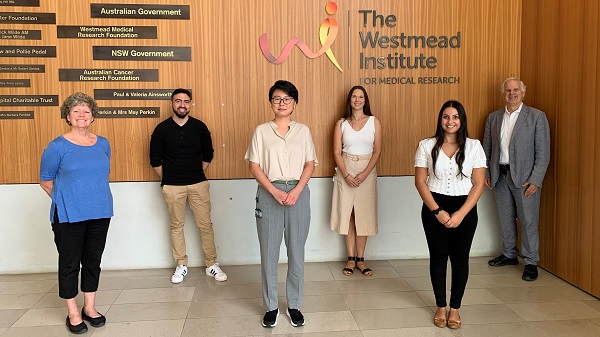The HIV algorithm that could unlock the secrets of COVID immunity
How long does immunity last after COVID-19? Such a straightforward question, yet one that – for now, at least – is absorbing researchers all over the world. Unlocking the secrets of immunity to SARS-CoV-2 infection will have profound implications for the way we manage the pandemic and develop vaccines.
NSW Health is investing heavily in finding the answer by awarding a COVID-19 research grant to a Westmead Institute for Medical Research team working on novel tests to establish the level and duration of immunity in people who have been infected. They expect the information they generate to inform second and third generation vaccines to keep the community, in particular healthcare workers and the elderly, safe.

Chief Investigator Professor Anthony Cunningham is one of Australia’s most experienced viral immunologists, well known for his work with a range of viruses and vaccines. While there are just a handful of cases of COVID-19 reinfection worldwide, they are well documented and, he believes, indicates a worrying prospect of more. And with several new and more dangerous variants now to contend with, the question of the duration of immunity is critical. But, it’s by no means an easy question to answer.
“It takes time to know, but we need to know now. That’s true of a lot of things about COVID,” Cunningham reflects.
How the body remembers a virus
Immunity is complex. It varies according to each individual and the biology of the virus itself. And the human body responds in two ways: it creates antibodies in the first instance and, over time, what Cunningham describes as “immune memory cells”.
“For instance, if you get a hepatitis B vaccine, you’ll be covered for more than 30 years,” he explains. “Your antibody level may drop right off but you’ve still got memory cells – T cells and B cells.”
“I’m particularly interested in that memory, because it’s what gives you long-term cover, and obviously that’s what you want a vaccine to produce,” he adds.
In testing, results can be affected by other coronaviruses, such as the one that causes the common cold, or the new variants. The team, under the leadership of molecular biologist Professor Sarah Palmer, co-director of the Centre for Virus Research at Westmead with Cunningham, is using computer algorithms borrowed from HIV research to create an effective new test for T cell immunity.
The researchers will then use the test to measure the level and duration of the immunity of Australians who have had COVID-19, as well as of those who have been vaccinated against the infection. The work is well underway, with blood samples already being tested and early findings published. The NSW Health COVID-19 Research Grant will enable expansion of the project and bring it, they expect, to a successful conclusion.
Focus on an overlooked group
Cunningham has a particular interest in vaccines for older people – an area he feels has, for too long, been overlooked. The study will focus, too, on the comparative immunity of older and younger people who have had COVID-19, to help understand the differences and deliver more effective vaccines for the elderly.
Aging causes a decline in the immune system and, with it, a much lower level of vaccine response. With the elderly among the most vulnerable to COVID-19 and, thus, a vaccination priority, Cunningham stresses the need for quality data to inform future approaches: booster shots, potentially, second or third generations vaccines or even immunostimulants to turbocharge the immune system to fight infection.
“I think the community has got to understand that this vaccine development business may be incremental. We may be able to protect a large part of the community over the next year or two, but then, we might need to step it up. It may not all occur in one go,” Cunningham says.
“Scientists are always looking to the future and trying to prepare themselves to answer scientific questions, so we can protect the community. That’s exactly what we are trying to generate.”
By Michelle Schlechta
Updated 4 years ago